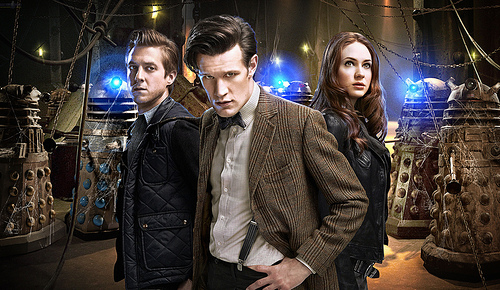Into The Hive Mind: Sailing The Good Ship

I'm going to be honest here; I've been struggling with how to go about writing this topic for a while now. And it's not because of any personal reason, but it's such a quintessentially fandom concept and I want to explain it thoroughly while being respectful and considering all the questions that a new fan might have. I know this is a somewhat bizarre concept (even if it's not exactly new), but the best way to get a better idea of the "world of shipping", I suppose, is to just leap into the water feet first (if you pardon the water pun).
When a person "ships" something, he or she enjoys the idea of those two people participating in a romantic relationship. The shipper would like to see a canonical relationship formed between the two participants.
Do you know how, sometimes, when there's that "spark", that little bit of chemistry, between two people, their friends or family tries to encourage a relationship? (If you don't know that person, then you are that person.) That's shipping.
It generally refers to romances that are unclear, undefined or hinted at, but it's evolved to the point where people will ship quite literally anyone and anything. (I know about a person who ships a walking cane and an umbrella.) (It's a joke.) (See "crack ships", below.)
The word itself is derived from "relationship". Although the term "ship" first came from "The X-Files" fans, but it's been a part of fandoms since the beginning. It was further perpetuated by fans of the anime "Pokémon".
What is widely considered to be the first "fandom", "Sherlock Holmes", had a huge culture that considered Holmes and Watson to be in any variety of romantic attachment—from homosexual to homoromantic to unrequited or asexual. Doyle himself was very aware of the feelings of a subset of his fans, in spite of Victorian sexual repression.
"Slash" ships are those that surround homosexual couples (arguably the more popular of the two, or, at least, the more visible and well-known.) The term "slash" derives from the slash that separates the two characters: Kirk/Spock from "Star Trek" was the first to be called "slash", predating the use of the overarching term of "shipping" but almost two decades. While slash usually denotes all homosexual pairings, some fans denote the difference between gay and lesbian relationships as "slash" and "femslash". From the anime and manga fantoms, ships are more often called "pairings". Gay relationships are referred to as "yaoi" and lesbian relationships are called "yuri".
If a person has one main ship, it is called his or her "OTP", which gained notice on Tumblr and Livejournal. It supposedly stands for "one true pairing" or "original top pairing", but, as of late, it's become more of a joke within fan communities, as many fans have multiple ships they refer to as their "OTPs". Occasionally, if a ship is common enough within a fandom, it will be called the "fandom OTP"; however, this does not mean that all fans ship it, nor does it imply that the other ships are of lesser value.

While referring to a ship, it's most common to use either the slash mark, which is not exclusively restricted to homosexual pairings but can also be used for "het" pairings, or a portmanteau couple name. Within the "Supernatural" fandom, one of the more popular ships is Destiel, a slash ship between Dean and the angel Castiel. These portmanteaus can occasionally be used as the butt of a joke, such as the ship between The Hunger Games' Katniss and Peeta, which is occasionally called "KatPee" or "Peeniss" because if there's one word that can describe fans, it's mature.
Perhaps you recognize the name "Brangelina"? This is an example of a real life canonical ship—ships are not relegated to fandom, although they are more prevalent within those fan communities. I know someone whose OTP is Barack and Michelle Obama. And when your mom wanted you to go out with that cute boy from your school? Your mom was shipping you two. Occasionally, more creative labels will be developed. Within "Pokémon", the relationship between Jessie and James is called "Rocketshipping"; in "The Avengers", the relationship between Frost Giant/Jotun Loki and hero Iron Man/Tony Stark is called "IronFrost". "Super Husbands" refers to Iron Man/Tony Stark and Captain America/Steve Rogers' ship. Some names are more ambiguous—"Science Bros" sometimes refers to Tony Stark and Bruce Banner's bromance, but it also can refer to their slash ship. (Note: I prefer "Science Alliance" as a brOTP name because it rhymes, but nobody listens to me.) In "Harry Potter", some shippers actually refer to the pairings as the "HMS (blank)", furthering the lame naval puns that shippers love, myself included.
You may see something called a "crack-ship" or a "crack!ship" or some variation thereof in your fandom travels. This refers to something largely considered to be a joke, or created for the humorous purposes. The ship between the walking cane and the umbrella, or between saltwater and freshwater (don't ask), or between anything that is quite clearly unrealistic—those are crack ships, often. Generally, in fandoms, the word "crack" refers to wildly unrealistic and funny aspects of fandom. Funny comics featuring illogical situations, ridiculous ships, the things that make fandoms seem nearly-insane, that's crack.

A character who is often paired with several ships is called a "fandom bicycle", for reasons I do not feel are appropriate to discuss in this column, mostly because I'm embarrassed. I'm sure you can infer, and if not, look here. I, heavily influenced by TVTropes as I am, prefer "Launcher of a Thousand Ships".
As with all things fandom, shipping can be very emotional. On Tumblr, there's a running joke that fans spend 90% of their time obsessing over the lives of fictional couples. (It's probably true.) When a person feels his or her ship is threatened, the retort can be vicious, leading to the ubiquitous "shipping wars". A common shipping war is "Romione" versus "Harmione"—within the "Harry Potter" fandom, arguments between the Ron/Hermione shippers (which SPOILER ended up being a canonical relationship) and those who wanted Harry/Hermione became a bitter feud at a time, baffling author J.K. Rowling. After "Harry Potter and the Deathly Hallows", which featured an epilogue that couples Ron and Hermione, and Harry and Ginny, some began to tag their Harmione posts or beliefs with "EWE", standing for "Epilogue? What Epilogue?"
There have been academics and amateurs alike who have written essays and hundreds of thousands of pages of text regarding their "OTPs", even if they don't call it that. Debating is fine. Arguing is not.
Shipping wars can get nasty quickly. Thinking about it rationally and logically, it's ridiculous to see intelligent people at odds with each other over the lives of fictional characters. But fandoms aren't often rational or logical—passions aren't based around common sense. Common sense dictates that we do exactly as we're supposed to without investing ourselves at all into what we love, because it's not the most productive use of our time. But by internalizing our ships, by investing ourselves into fandoms completely, it becomes a part of us, as fans. When someone "goes against" a person's ship, he or she can feel attacked.
So know this: No ship, regardless of canonical affiliation, is better than another. Equality is a huge problem in fandom. Not recognizing that everyone is free to have his or her own beliefs, putting down others because of his or her ships—it's simply childish think that someone is wrong because he or she does not believe the same way you do. It's even more childish to believe that you can change the other's beliefs by saying that person is wrong.
I've seen het-shippers put down slash-shippers (many of which center around male participants) as misogynists; I've seen slashers put down het-shippers as homophobic or close-minded. For more detail, wait until we cover the "Sherlock Holmes" fandom, especially regarding the "Elementary" controversy and the fan battles that ensued afterwards. Shipping spreads between demographics, orientation, cultures, gender and ages. Vitriol is unnecessary. As J.K. Rowling called it, it can become "cyber gang warfare".
Not all fans have ships. Some prefer to watch the mayhem ensue in the peace and quiet of the non-shippers' corner. Some truly have an OTP and will not ship anything else, so they avoid shipping wars, especially if their ships are less common or popular and therefore not often contested. I prefer to sit and watch as the fandom explodes around me like sea mines of bitter contention (though I sit and observe, it does not mean I approve of mindless and needless argument).
Shipping is serious business, but it might also be an insight into human nature; we really are wired to look for romance in the tiniest of places. We already invest a large part of our lives living vicariously through these characters, and these people are easy to relate to. We want a happy ending, and characters often get those. (This is not always true. Your ship might be the Titanic, and life or canon is the iceberg.) (That would make you Leonardo DiCaprio. I suppose there are worse fates.)
Next week, let's take a look at creative fanwork, including, but not limited to, fanfiction and fanart.
Contact columnist/shipper on deck Christine Bancroft here or find her on Twitter here. Here is a complete list of shipping tropes as given by TVTropes, which, if you can't tell, is my favorite website of all time.



